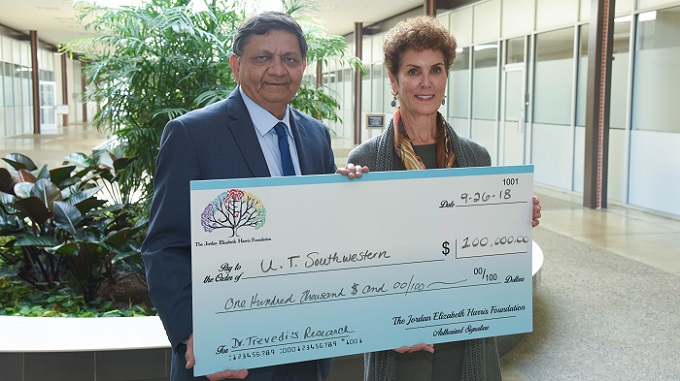Foundation gives $100,000 to further depression research

Ellen Harris presents a $100,000 check to Madhukar Trivedi, M.D., founding Director of the Center for Depression Research and Clinical Care
By Sharon Reynolds
A gift of $100,000 from the Jordan Elizabeth Harris Foundation will support UT Southwestern research to help identify early signs of depression in children and boost their resilience to the disease. Resilience is the human capacity to face, overcome, and be strengthened by adversity, which according to research, is important for children faced with a mental illness like depression.
The Foundation was established in 2014 by Tom and Ellen Harris to honor the life of their eldest daughter, Jordan, who is remembered for her warm heart and passion for helping others. She was valedictorian of her high school class, a National Merit Scholar, a Stamps Scholar at the University of Michigan, and an athlete. But inwardly, Jordan was suffering in silence from severe depression. At the age of 22, she ended her pain by taking her own life.

Jordan Elizabeth Harris
"Jordan was a joyful person who did her best to hide her depression because she didn't want to burden anyone with her illness,” Mrs. Harris said. “We had so many questions after she took her life. As we began sharing our story with others, we discovered that most of the people we spoke with had a personal story about depression and suicide. Because of the stigma surrounding suicide, it's a subject that's very seldom discussed"
The Harris family found solace through their Foundation’s mission to prevent loss of life by suicide. Since 2015, the Foundation has made gifts totaling $265,000 to support research at the UT Southwestern Center for Depression Research and Clinical Care (CDRC).
“The work of the CDRC includes a major focus on identifying depression in adolescents as early as possible, and building their resiliency skills that could change the trajectory of the disease,” said Dr. Daniel K. Podolsky, President of UT Southwestern. “We are extremely grateful for the support of the Jordan Elizabeth Harris Foundation, which is working tirelessly to save lives by funding both depression research and efforts to break the stigma associated with it through suicide prevention training and community education for children and adults.”
Depression is a serious illness that often begins in childhood. According to a recent study from the Centers for Disease Control and Prevention and the Substance Abuse and Mental Health Services Administration’s National Survey on Drug Use and Health, rates of depression, psychological distress, and suicidal thoughts and actions have increased significantly among adolescents and young adults from 2005 to 2017.
Scientists do not know what causes depression, and there are no reliable lab tests to diagnose the disease. But already scientists in the CDRC are making significant progress toward identifying the biomarkers of depression, which include blood tests and brain imaging. This work is aimed at eliminating the current trial-and-error approach for treating mental illness, as well as boosting treatment efficacy by personalizing therapies based on each patient’s “biosignature” of the disease.
“When depression hits early in life, it can rob teens of their potential. Suicide leaves so many questions unanswered and clearly devastates families. That’s why we are working to identify those most at risk, intervene early, and change the course of depression,” said Dr. Madhukar Trivedi, Director of the Center for Depression Research and Clinical Care, Professor of Psychiatry, and Chief of the Division of Mood Disorders at UT Southwestern.
According to the research that Dr. Trivedi and his colleagues are conducting, simply talking about depression and suicide is an important first step.
“There is a common myth that you may bring on depression or suicidal thoughts just by asking someone about them. But scientific evidence shows the opposite,” he added. “Through our research, we want to identify blood and brain tests to rapidly identify problems and develop new treatments to match every individual. It is a true tribute to Jordan and profoundly impressive to know that Tom and Ellen Harris have made it their cause to increase awareness and support research on youth depression and suicide. Their unstinting support for the work of the Center leaves me and my whole team truly mindful of the work ahead.”
Dr. Podolsky holds the Philip O’Bryan Montgomery, Jr., M.D. Distinguished Presidential Chair in Academic Administration, and the Doris and Bryan Wildenthal Distinguished Chair in Medical Science.
Dr. Trivedi holds the Betty Jo Hay Distinguished Chair in Mental Health and the Julie K. Hersh Chair for Depression Research and Clinical Care.
Suicide – a growing public health issue
|
- In 2018, an estimated 3,488 Texans died by suicide.
- Suicide is the second-leading cause of death for people ages 15-34.
- Depression is the most common condition associated with suicide and is often undiagnosed or untreated.
- Twice as many people die by suicide annually than by homicide.
- More young people survive suicide attempts than actually die.
Source: American Foundation for Suicide Prevention; Centers for Disease Control and Prevention
|